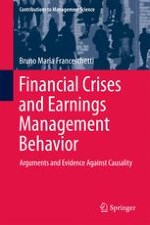2018 | OriginalPaper | Buchkapitel
5. Does Financial Crisis Cause Earnings Management?
verfasst von : Bruno Maria Franceschetti
Erschienen in: Financial Crises and Earnings Management Behavior
Aktivieren Sie unsere intelligente Suche, um passende Fachinhalte oder Patente zu finden.
Wählen Sie Textabschnitte aus um mit Künstlicher Intelligenz passenden Patente zu finden. powered by
Markieren Sie Textabschnitte, um KI-gestützt weitere passende Inhalte zu finden. powered by
